No one likes wearing a mask — but with COVID-19 cases rising, you should put it on more often than you think
Let's face it: No one enjoys having a mask cover half their face.
They can be scratchy, sweaty, stuffy — all reasons why people quickly ditch them on a restaurant patio, avoid wearing them around friends and family or "forget" them while dashing into a store.
But experts warn that at this point in the pandemic, when the benefits of mask-wearing are growing clear — and COVID-19 cases are rising rapidly, with hospitalizations and deaths expected to follow — Canadians should be donning their masks more, not less.
"Keep wearing your mask, as much as you can, especially with people you don't live with," Toronto's medical officer of health, Dr. Eileen de Villa, stressed on Monday.
Multiple experts who spoke to CBC News this week say that means keeping a mask on in a variety of settings, even if local bylaws don't mandate it.
"People think their private residences are exempt from the science of COVID-19 and don't have that transmission risk," said Dr. Zain Chagla, an associate professor of medicine at McMaster University and an infectious disease consultant at St. Joseph's Healthcare Hamilton.
"As we keep talking about, a lot of this jump and surge is actually due to transmission in some private residences."

Family outings, cottage gatherings and a barbecue in a park have all sparked multiple cases of infections, according to public health officials in different Ontario cities.
Edmonton-based health policy expert Timothy Caulfield agreed that people should strive to wear a mask around anyone from outside someone's own household.
"If it's an indoor environment and you can't get that good two-metre space all the time, think about wearing a mask — even if it's family members," said Caulfield, Canada Research Chair in health law and policy and research director of the Health Law Institute at the University of Alberta.
So what about outdoors? Many people don't bother with masks outside, since there's consensus that outdoor spaces are far less risky for virus transmission when compared with indoor settings, thanks to the constant flow of fresh air.
But Chagla said masks could be helpful in any crowded outdoor space where staying a couple of metres apart is challenging — "even if you're on the patio, until you have to eat and drink, and then putting it back on afterwards," he said. "We just have to kind of get people to make it a reflex."
87% say mask-wearing is civic duty: survey
The advice to wear a mask in so many settings might be a confusing message after a stretch of shifting guidelines.
In the early days of the pandemic, there was scant evidence showing how helpful masks could be at reducing transmission of the new, and little-understood, SARS-CoV-2 virus.
More recently, studies have shown that masks reduce the rate at which sick people shed the virus and the distance droplets travel from your mouth.
Research on non-medical masks from a team at the University of Illinois at Urbana-Champaign, for example, found that many masks — and particularly those with multiple layers — are able to block a high number of droplets from getting through the fabric.
While the lab-based findings don't provide a perfect look at how virus transmission works in the real world, there's been growing consensus among Canadian public health officials that masks are a key tool for curbing the spread.

For months, face coverings have been an official recommendation from the federal government for times when physical distancing isn't possible.
Mandatory mask bylaws for various public spaces have also popped up in cities across the country, from the small Montreal suburb of Côte Saint-Luc to Ontario's largest cities, Toronto and Ottawa.
A growing number of Canadians also back that push.
More than 80 per cent now support governments ordering people to wear a mask in all indoor spaces, noted a recent online survey by Leger and the Association for Canadian Studies released on Tuesday.
Even more respondents — 87 per cent — said wearing a mask is a civic duty because it protects others from COVID-19.
WATCH | Quebecers disobeying mask rules will be fined, premier says:
Masks 'just one tool' to reduce transmission
While Canadians have largely embraced mask-wearing at spots like grocery stores and other crowded public spaces, experts worry the practice is less common behind closed doors, whether at a private backyard gathering or inside a restaurant.
"The concept still holds true for gatherings at one's own house and some of those other establishments where you can't wear a mask all the time," Chagla said.
"You probably should be wearing the mask — most of the time — in those establishments."

Dr. Anna Banerji, an infectious disease expert and faculty lead for Indigenous and refugee health at the University of Toronto, also stressed the need for patrons at restaurants, bars and shops to make more effort to protect workers.
"Because it's not just the consumers, it's the people that also work in the stores where they are being exposed to many different people," she said. "If all these people are coming in and not wearing masks or wearing them below their nose, that puts these people at risk."
Caulfield said masks remain "just one tool" to reduce the risk of transmission, alongside other basic precautions like hand-washing and keeping at least a two-metre distance from anyone outside your household.
It's a message that comes as Canada's chief public health officer, Dr. Theresa Tam, said the country is at a "crossroads" amid a surge of new COVID-19 cases.
"If you manage to reduce those contacts and make some choices of not going to big gatherings and some of these social events," she warned this week, "you can manage this without a lockdown."


